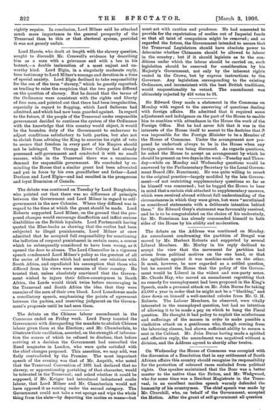Lord Harris, who dealt at length with the slavery question,
sought to discredit Mr. Creswell's evidence by describing him as a man with a grievance and with a bee in his bonnet,—a double insinuation of a most unjust and un- worthy kind. Lord Elgin, in a singularly moderate reply, bore testimony to Lord Milner's courage and devotion in a time of special anxiety. Lord Elgin declined to take responsibility for the use of the term "slavery," which he greatly regretted, as tending to raise the suspicion that the two parties differed on the question of slavery. But he denied that the terms of the Ordinance were consistent with the rights and liberty of free men, and pointed out that there had been irregularities, especially in regard to flogging, which Lord Selborne had admitted, and which had now been guarded against. In regard to the future, if the people of the Transvaal under responsible government decided to continue the system of the Ordinance with the knowledge that this country would object, it would be the bounden duty of the Government to endeavour to adjust conditions satisfactory to both parties, but also not to shrink from advising the King to exercise his right of veto to secure that freedom in every part of his Empire should not be infringed. The Orange River Colony had already possessed self-government and conducted it with no small success, while in the Transvaal there was a unanimous demand for responsible government. He concluded by re- minding the House that a similar grant had been advocated and put in force by his own grandfather and father—Lord Durham and Lord Elgin—and had resulted in the prosperous and loyal Dominion of Canada.














































 Previous page
Previous page